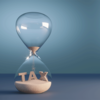
[ad_1]
The removing of indexation advantages from actual property transactions will transform useful for taxpayers when it’s seen via the prism of “precise market dynamics” relatively than plain arithmetic, CBDT Chairman Ravi Agrawal stated on Wednesday. The top of the direct taxes administration within the nation advised in a post-budget interview that the division did “some calculations” on this context earlier than the measure introduced by Union Finance Minister Nirmala Sitharaman on Tuesday in Parliament.
Agrawal additionally underlined that the brand new system says there will probably be “much less tax obligation” for a taxpayer right here.
The Price range 2024-25 has decreased tax charges on capital good points earned from the sale of home properties held for the long run however has eliminated the advantage of indexation obtainable to taxpayers.
The LTCG (long-term capital good points) has been decreased from 20 per cent with indexation profit to 12.5 per cent with out indexation for the true property sector.
Indexation is a mechanism to regulate the acquisition worth of an funding like a home to mirror the impact of inflation on such belongings.
Over the issues raised by a bit that feels taking away indexation will have an effect on the true property market adversely, Agrawal asserted that “virtually, in many of the circumstances, the brand new scheme can be useful”.
He stated there have been calls for from numerous quarters and taxpayers to “simplify” the capital good points regime.
The CBDT Chairman stated the intention of this Price range measure is to make this course of easy as any “sophisticated construction brings with it disputes additionally”.
Allow us to see virtually, the Central Board of Direct Taxes (CBDT) chief stated, what’s there out there at the moment.
“Take the case of actual property, the property charges or good points have gone up within the final ten years considerably. Now, evaluate your indexation with the brand new regime within the final 10 years, suppose you got a property in 2014, and you’re promoting it in 2024-25. The advantage of indexation can be just one.5 instances.
“So, take into account if the property is a few X, the index price of the analysis will probably be 1.5 instances…in 10 years, it can solely be going up by 1.5 instances,” he famous.
Now, we (CBDT and Earnings-Tax division) have finished some calculations and located that if the property fee has gone up by 3 times in 10 years, the brand new tax regime (as introduced within the Price range) is useful, the CBDT chairman stated.
“Virtually, in many of the circumstances, property charges have gone up by greater than 3 times. Go away apart the arithmetic that claims that if in ten years, the property fee has gone up two instances or one-and-a-half instances, then what occurs and so forth…the truth is that the property charges have gone up past 3 times and in realty sectors…tier one and tier two cities…circle charges have gone up…even the market charges.
“Property charges have gone up by far more in 20-25 years for 2001, as the bottom, and now in 2024, in these 23 years, if the property fee has gone up by seven instances or seven-and-a-half instances, then the brand new regime is useful. So, maths apart, whenever you come to the precise market, you discover that the brand new tax regime is best,” he stated.
Successfully, Agrawal stated, the duty of tax is much less (within the new regime).
“Now we have been dwelling with this indexation regime for lengthy and have gotten used to it, and it has come into our psyche. However, if we really begin analysing it, not from the arithmetic viewpoint, however from the precise market dynamics, then one would discover that this scheme is best,” he stated.
The CBDT chief stated the brand new regime can also be aimed toward simplification of the method — one which ought to be straightforward to understand (for the taxpayer), straightforward to implement (for the tax division), and it additionally targets disputes arising out of “multiplicity of provisions” are minimised.
He added that within the case of previous properties, the grandfathering clause, as per the 2001 indexation of truthful market worth, can be relevant.
The Price range has retained the indexation profit for taxpayers on properties purchased or inherited earlier than 2001. Nonetheless, the LTCG indexation proposal has been given impact “with speedy pressure”.
Questioned concerning the rationale for the Price range hike within the securities transaction tax (STT) on futures and choices (F&O) commerce from October 1, the chairman stated an “exponential enhance within the transactions” right here was being witnessed.
It was seen that “everybody was collaborating (in F&O)…there are extra dangers concerned on this and in addition the truth that if there’s a lot participation, can we really faucet some income from that?”
That being one purpose, the opposite is the query can we promote that? Now we have seen a bent, and will we are saying that it’s okay or we must always provide you with a regime that normalises (the system), he added.
The STT enhance in Price range got here a day after the Financial Survey flagged issues over rising retail traders’ curiosity in spinoff buying and selling.
The survey stated that speculative commerce has no place in a creating nation. It additionally acknowledged that the sharp enhance in retail investor participation in F&O buying and selling is probably going pushed by people’ playing instincts.
[ad_2]
Source link





Leave a Reply